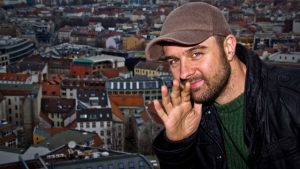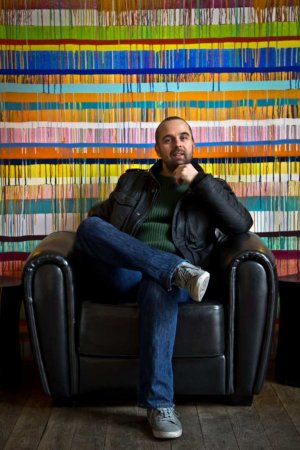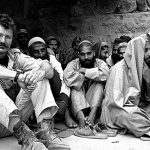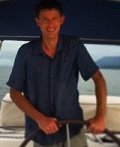 Michael Wigge is a well-known media personality in Germany – a journalist, comedian, documentarian and world traveler. In 2010, Wigge traveled 25,000 miles from Europe to Antarctica – without any money – which he documented and turned into the upcoming travel series “How to Travel the World For Free” which will be airing on PBS and on local channels in over 70 markets across the US starting this month and running through May and June
Michael Wigge is a well-known media personality in Germany – a journalist, comedian, documentarian and world traveler. In 2010, Wigge traveled 25,000 miles from Europe to Antarctica – without any money – which he documented and turned into the upcoming travel series “How to Travel the World For Free” which will be airing on PBS and on local channels in over 70 markets across the US starting this month and running through May and June
Q. Tell us a little about yourself and how your first became interested in travel.
I grew up in a small countryside town in Germany and became interested in travelling on my own at the age of 14. I started travelling as an MTV Reporter and visited extreme locations all around the world: Testing the Japanese bowing techniques, visiting the Tomatina festival in Spain and visiting the Buckhingham Palace in London, dressed up as King Henry VIII.
Q. In 2010 you set out on an amazing journey to travel the world without any money. You traveled 25,000 miles from Europe to Antarctica–without any money – tell us briefly what inspired you embark on this remarkable trip.
It was always my childhood dream to travel once to the exclusive destination of Antarctica. Since I didn’t have enough money to spend huge amounts on polar luxury cruise ships, I decided to give it a try and travel for free. After one year of intense planning I started the trip: 150 days, eleven countries, and then every day the urge to somehow get free food, free accommodation and free travel.
Q. What are some of your top tips for how to secure free transportation while traveling?
In many countries it’s ok to hitchhike, especially in Europe. Unfortunately in most states of the US, hitchhiking is not legal. But there other options as well: I crossed Ohio by foot and by bike. I offered the service of “pillow fighting” for a dollar on the streets of San Francisco, where people were willing to give a buck for a good pillow fight. After a few days I had $300 for a plane ride. I worked on a cargo ship across the Atlantic from Belgium to Canada for free, which was a big step for me. And I worked on a luxury cruise for free to reach finally Antarctica from the southern tip of Argentina.
Q. Can you share with our readers a memorable story from your trip that occurred as a result of your traveling with no money?
In Albuquerque in New Mexico I met Joseph, a homeless person. He told me his life story and introduced me to the homeless support system of the church to get free food, free shower and free telephone service. This was an interesting, although not always easy, view into the homeless scene. Joseph and I slept at night in a city park and really became friends. Unforgettable!
Q. What was the most challenging country on your trip to travel in for free?
It was in Bolivia, the poorest country in South America. I felt that maybe it wasn’t such a good idea to attempt my goals here, since people suffer here and not having much money is a way of life. This made me return to Peru and Chile as quickly as possible. I felt that a story to travel for free should be done in countries with little poverty.
Q. While not using any money of your own on this trip – you spent some time “working” in order to keep traveling. Tell us about one of the most unique jobs on your travels that you “created” in order to eat, find accommodation, transportation, etc.
- In Panama I worked for the German ambassador as his butler: Serving him wine, polishing his shoes and opening doors for him! It was great since he paid the flight to Colombia.
- In San Francisco I offered “Pillow Fighting” for a dollar, which helped me to reach Costa Rica.
- I offered “The Human Sofa” in Las Vegas, so tourists could sit on my back in the heat of 100 degrees. Here I also collected a dollar each.
- In San Francisco I also offered the service called “the Hill Helper” pushing people up the steep hills of the city.
- In Peru I wanted to visit the Inka site Machu Picchu for free. Therefore I worked as a tourists’ porter on the so called Inka trail for five days. Carrying almost 60 pounds of luggage over an altitude of 14,000 feet was hell.
Q. For those not familiar with couchsurfing – it is an organization that allows travelers to stay for free with other travelers. What was the coolest, most unique couchsurfing experience on your money-free trip?
I slept on about 20 couches during my trip. All of them were incredibly nice and instrumental in me traveling for free. In Panama, I actually stayed in a couchsurfers’ mansion on my own. After meeting online, he trusted me to pick up his key somewhere and stay in his place while he was gone!
Q. What is the focus and or goals of your company, Pichu Productions?
I produce comedy and travel programs. So far I have done this with my team mainly for the German audience in the form of TV programs and books. But we would now also like to offer our stories more to the North American communities. We are trying to combine humor with valid information about cultures, social problems and general topics like “money”.
Q. Out of all your achievements in your career, what are you most proud of and why?
I rode a donkey 60 hours and 4 minutes throughout England. Yes, I am proud And no, I would never do it again.
Q. Since you’ve spent a fair amount of time in London – what do you enjoy most about this city?
I really like the British humor. It’s sharp and ironic. During my four years in London, I met many people who tried to teach me to not to always take everything so seriously.
BIOGRAPHY
 Michael Wigge has been working as a reporter, presenter and producer for both private and public television channels for nine years. His work is characterized by a mixture of journalism and entertainment/comedy. His area of expertise lies in culture topics, which he approaches in an entertaining fashion.
Michael Wigge has been working as a reporter, presenter and producer for both private and public television channels for nine years. His work is characterized by a mixture of journalism and entertainment/comedy. His area of expertise lies in culture topics, which he approaches in an entertaining fashion.
In 2002, Wigge drew attention to himself for the first time. He produced and presented unconventional comedy clips for and in the daily show “London Calling” on TV broadcaster VIVA plus. In this context he conducted the longest recorded donkey ride in history of music television with 60.4 hours.
In 2003, he returned to Germany and attracted the attention of the political world as satirical reporter “Dr. Wigge” for the political program “The Chancellor’s Bungalow”. From 2004 to 2006, he was on the road as a reporter and comedian for VIVA and MTV. He carried out unusual tasks in his show, including a four-day self-experiment as a voluntary prisoner to portray a jail in Cologne.
Wigge received the ZDF VJ award for his Deutsche Welle production in 2009. His book “To the End of the World without a Penny” was published in Germany and South Korea in 2010. The 5 x 30 mins video documentary series was broadcast on zdf_neo TV. For this project, Michael Wigge travelled 35,000 kilometres without a penny in his pocket.
Wigge produces in 2011 the TV series “Trade-Up”. Therefore he barters during a world travel from an apple to a house in Hawaii. This stunt is been broadcasted as 6×45 minutes on ZDFneo and published as a book.
Visit his website at: www.howtotraveltheworldforfree.com; a book of the same title is also available now.








Leave a Reply